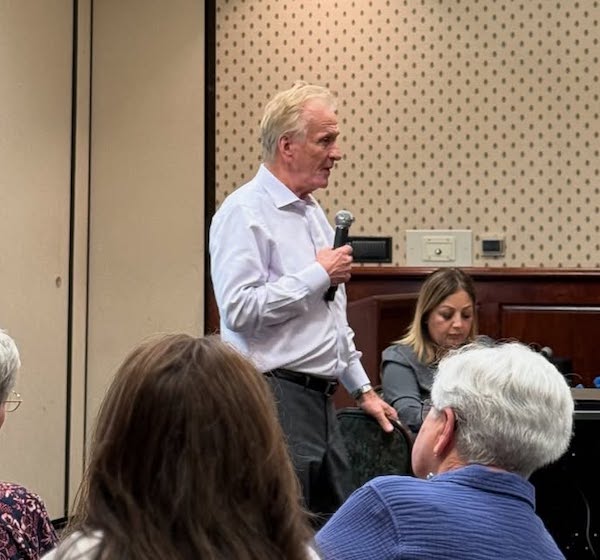
A 75-acre site is proposed for an affordable housing project in Selma. Google Maps image
Written by Dylan Gonzales
In the Central Valley, the balance between commercial and residential development is becoming increasingly complex as cities work to address the growing demand for both types of spaces.
In Selma, Dwight Nelson, the owner of Selma Auto Mall, has long been involved in city projects, dating back to his time on the Selma Planning Commission, and is frustrated with the lack of progress on retail development in the city, particularly a Costco.
Nelson is particularly concerned about land west of Highland Avenue and south of Floral Avenue — a 75-acre site for a project that began over 30 years ago when he was required to rebuild it as part of a development.
An intersection there was designed to help lower traffic congestion caused by the Floral Avenue overpass and support future growth. It is located near Selma’s busiest shopping center, which is anchored by Walmart.
Nelson invested approximately $3 million in the infrastructure to ensure the area could accommodate major retail developments such as Costco.
He said the idea was that this roadwork would open up opportunities for stores such as Costco, Best Buy and Target, which would help Selma thrive as a top sales tax generator in Fresno County.

His vision for the area, which he continues to advocate for, centers around the economic boost that major commercial retailers could bring to the city. Nelson pointed out that Costco could drive not only sales tax revenue but also provide significant job opportunities for the region.
However, Nelson expressed frustration with the city’s leadership’s lack of follow-through. Despite his efforts, including the significant investment in infrastructure, the city’s leadership, particularly under former city manager Fernando Santillan, did not prioritize bringing Costco or another large retailer to the area, he said.
With his frustration with the city increasing, Nelson hosted a town hall-type event on March 25 at his Legends Tap House & Grill restaurant.
He said that 63 people attended his town hall, which he noted was more people than a city council meeting.
During his meeting, Nelson asked Selma residents how many of them have Costco cards. “Virtually everybody raised their hands,” he said.
“Everyone with Costco cards is driving out of Selma and going to spend their money in other communities. Sales tax is going to be created in other communities,” Nelson said.
The nearest Costco locations to Selma are in Hanford, Fresno and Clovis, each about a 30-minute drive away.
He described an environment in which long-time residents and business owners like himself felt ignored, particularly after Save Mart pulled out of the area.
Nelson took particular issue with the Casitas Project, which proposes development of 600 low-cost housing units. He said this would not only fail to bring in the desired retail but might also hinder Selma’s long-term economic growth.
River Park Properties II, headed by Fresno developer Ed Kashian, is the applicant for the project.
A notice of preparation for a draft environmental impact report was released in July 2024. Casitas would be mixed use, with a planned 40,000 square feet of retail and food service uses and a 100-room hotel.
“If Kashian wants to build low-cost housing, there’s probably good places in Selma to build that,” Nelson acknowledged, “But to take property that was originally designed for big box stores and put in low-cost housing makes no sense at all.”
Representatives from Kashian’s Lance Kashian development firm did not respond to requests for comment. Messages left for comment with the City of Selma were not returned Thursday morning.
Another Kashian is also developing a residential project in Lemoore.
In April, the Lemoore City Council approved the sale of city-owned land along Highway 198 to KKAL, LP, led by John Kashian, for a proposed 240-unit affordable housing development.
The council designated the parcel as “exempt surplus land,” allowing the project to proceed under streamlined approval processes outlined.
The project is intended to help meet the city’s growing need for housing, mainly affordable units, while using a strategically located site near major transportation areas.
The project would remain 100% affordable for 55 years and is expected to help the city meet its affordable housing requirements under state law. Lemoore will also be applying for grant funding to support off-site infrastructure improvements, like sidewalk repairs and bike lanes, which could be funded through the development.








